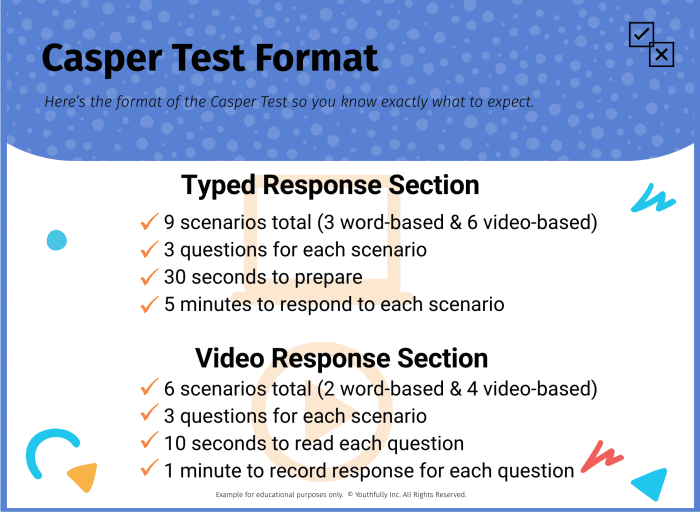Welcome to the world of Casper sample questions and answers, where preparation meets confidence. This comprehensive guide delves into the intricacies of these questions, empowering you with the knowledge and understanding necessary to navigate the assessment process successfully.
Our team of experts has meticulously crafted this resource, providing you with a deep dive into the structure, format, and content of Casper sample questions. We explore the different categories of questions, examining their purpose and relevance. We also discuss the use of visual aids and the importance of accessibility and cultural sensitivity in sample question sets.
Sample Questions and Answers: Casper Sample Questions And Answers

Sample question sets provide a valuable resource for individuals preparing for various assessments or examinations. They offer a glimpse into the format and structure of the actual test, enabling candidates to familiarize themselves with the types of questions they may encounter and practice their answering skills.
These question sets typically consist of a table containing sample questions along with their corresponding answers. The questions cover a wide range of topics and may vary in difficulty level. The structure and format of the questions and answers are designed to reflect the actual assessment or examination.
Categories of Questions, Casper sample questions and answers
Sample question sets often categorize questions based on their content or purpose. Common categories include:
- Knowledge-based questions:Test candidates’ understanding of fundamental concepts and theories.
- Comprehension questions:Assess candidates’ ability to interpret and analyze information presented in a text or passage.
- Application questions:Require candidates to apply their knowledge and skills to solve problems or make decisions.
- Analysis questions:Challenge candidates to break down complex concepts into their constituent parts and examine their relationships.
- Evaluation questions:Ask candidates to assess the strengths and weaknesses of different approaches or arguments.
Difficulty Levels
Sample question sets may also categorize questions based on their difficulty level. Common difficulty levels include:
- Easy:Designed to test basic knowledge and understanding.
- Medium:Require some level of critical thinking and problem-solving skills.
- Hard:Challenge candidates with complex and abstract concepts.
The difficulty level of a question is typically determined by factors such as the complexity of the concept being tested, the amount of prior knowledge required, and the level of cognitive skills needed to answer the question.
Use of Visual Aids
Sample question sets may incorporate visual aids, such as images, diagrams, or charts, to enhance understanding and provide additional information. Visual aids can help candidates visualize complex concepts, identify patterns, and make connections between different pieces of information.
Accessibility Considerations
It is essential to ensure that sample question sets are accessible to individuals with disabilities. This may involve providing alternative formats, such as Braille or large print, or using clear and concise language that is easy to understand.
Cultural Sensitivity
Cultural sensitivity is also important in sample question sets. Questions should be designed to avoid bias and ensure that they are inclusive of diverse perspectives. This means avoiding language or content that may be offensive or discriminatory.
Questions Often Asked
What is the purpose of Casper sample questions and answers?
Casper sample questions and answers provide candidates with an opportunity to practice and familiarize themselves with the format and content of the actual Casper assessment.
What are the different categories of Casper questions?
Casper questions typically fall into several categories, including ethical dilemmas, interpersonal skills, and problem-solving scenarios.
How can I use visual aids in my Casper responses?
Visual aids can be used to enhance understanding and provide additional information in Casper responses. For example, candidates may use diagrams to illustrate ethical dilemmas or flowcharts to demonstrate problem-solving strategies.
Why is accessibility important in Casper sample questions and answers?
Accessibility ensures that Casper sample questions and answers are available and usable by individuals with disabilities. This includes providing alternative formats, such as large print or audio recordings, and using clear and concise language.
How can I ensure cultural sensitivity in my Casper responses?
Cultural sensitivity involves being aware of and respecting different cultural perspectives and values. In Casper responses, candidates should avoid bias and stereotypes and strive to use inclusive language that is respectful of all cultures.


